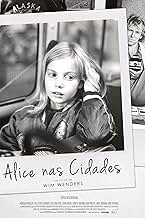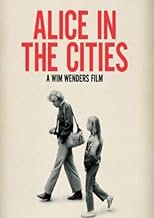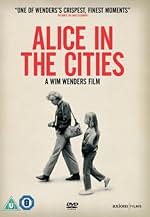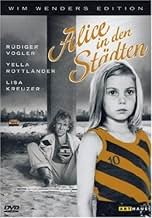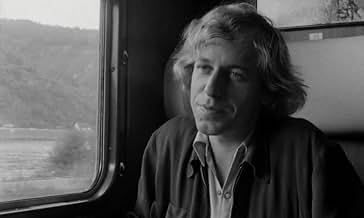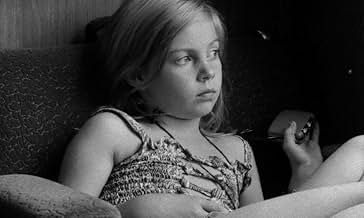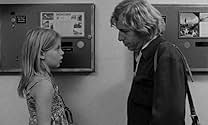A German journalist is saddled with a nine-year-old girl after encountering her mother at a New York airport.A German journalist is saddled with a nine-year-old girl after encountering her mother at a New York airport.A German journalist is saddled with a nine-year-old girl after encountering her mother at a New York airport.
- Director
- Writers
- Stars
- Awards
- 1 win & 1 nomination total
- Lisa van Damm
- (as Elisabeth Kreuzer)
- Young Girl on Ferry
- (uncredited)
- Chuck Berry
- (archive footage)
- (uncredited)
- Man at Chuck Berry concert
- (uncredited)
- Organist at Shea Stadium
- (uncredited)
- Woman Behind Philip and Alice on Plane
- (uncredited)
- Man on Empire State Building Roof
- (uncredited)
- Director
- Writers
- All cast & crew
- Production, box office & more at IMDbPro
Featured reviews
"Alice in the Cities" is the first of three consecutive films by Wim Wenders about the open road, each starring Rüdiger Vogler as a similar, if not identical character. The second, "The Wrong Movement" (Falsche Bewegung) (1975), is an incredibly difficult slog of total human alienation. The third, and much better than the second film, "Kings of the Road" (Im Lauf der Zeit) (1976) is similar to this one, as Mr. Winter continues his journeys through the German countryside.
This is a film about childhood relationships - not those we have with our peers, but those of a greater age. This makes perfect sense to me, as I would without fail seek out the company of an adult over the fleeting fancies of ones closer to me. To me, anything past fully grown would blur together, all except for the very old. Philip isn't comfortable with children, just as I have become over time. It is a hallmark of those who feel that they have never outgrown their own childhood, who feel so lost inside the adult world that the past feels foreign to a present that will never fit. Their belief that living in the future is futile keeps them grounded in today, their only salvation from a life spent dreaming.
Reality is harsh in "Alice in the Cities". The release comes where life lives. The precious and precocious sensation of human interaction runs like a vein through the center of everything. This is a story suitable for anyone, not because it holds back, but because it is all in. In love with the very same world it fears, holding the hands of the same dream on whose feet it steps on. Like we all do in life. This film feels exactly like those first two or three years of your earliest memories. If you let it, you'll be taken further back than you'd have ever imagined.
This is the first film of what is regarded as Wim Wenders loosely connected road trilogy, following on from this picture would be Falsche Bewegung in 1975 and then culminating with the quite brilliant Im Lauf der Zeit in 1976. Quite what Wenders intentions were with this picture is is not immediately clear, for certain his framing {obsession} with American culture comes to the fore from the off, both in the changing landscapes and the use of American pop and rock music. But as things progress it's the simple message of purpose that a chance encounter can have, our odd couple here are at first deeply suspicious of each other, not caring for each others company in the slightest, but as time moves on they begin to understand each other and tune into each of their respective mental waves. Life quite simply found a way thru two differing humans thrust together unwillingly, it's not deep or remotely profound, it's simple and warm in its execution, and the final (tremendous) pull away aerial shot that Wenders gives us crowns this accomplished and very enjoyable piece. 7.5/10
A silenced bewilderment has already become routine in the completely paralyzed life of a man, who only pities himself, and who apparently has lost all access to his fellow men. Therefore the girlfriend in New York, to whom he wants to unburden all his world-weariness can do nothing for him but show him the door, saying: "Nobody told me how to live either."
So he forgot how to live, our very typical hero of modern times. But just as in a children's story rescue suddenly appears in the shape of a wondrous fairy, Philip Winters also has a surprising encounter, which will help him to determine his position in this world anew. The unexpected enlightening figure is a child, nine-year-old Alice. Her mother, whose acquaintance Philip had somehow forcibly made at the airport counter, has let her down, leaving behind a succinct message, in which she asks Winters to take provisionally charge of the girl until she will follow them to Amsterdam in a later airplane.
The mother does not appear though, and thus Philip Winters does not have any other alternative but to go on looking after the child, a responsibility he most willingly would like to avoid. But Alice remains persistent, she scents the possibility of an exciting adventure. She mentions a grandmother, who possibly lives in Wuppertal, West Germany. Unwillingly Winters bows to his fate, but after a few abortive attempts he simply deposits her at a police station and goes to a Chuck Berry concert on his own.
That could be the end of the story. But as I already mentioned, Alice is a fairy. And so she does not only come back, but also actually succeeds in getting a mechanism going in Philip Winters which seemed to be already dead and buried: the reference to the other one, the preparedness to get involved with his fellow creatures. At the end of the film he seems to be recovered, the train in which he and Alice are sitting, is obviously moving along on newly built tracks, the decisive switching of the points has been made.
At least for the time being. For it is exactly in this hopeful and promising moment that we have to leave this wonderful movie. We are just allowed to throw another brief glance at the protagonist, who is sitting in the compartment joyfully united with Alice, a moment before the camera steps back and rises into the air, moving irresistibly away from the scene, until it depicts a vast panoramic view. But our eyes are still fixed on the train that hastens steadily through the immense landscape heading towards a destiny unknown.
Alice in the Cities marks the first appearance of the director's recurring character Philip Winter (Rüdiger Vogler) who would later reappear in several other Wenders titles. This time he is a journalist and photographer who has been assigned to travel around in the United States and write a story about his experiences but suffers from a bad case of writer's block. Just before returning to his native Germany he meets a German woman called Lisa (Lisa Kreuzer) and her young daughter Alice (Yella Rottländer) who are also planning to return home. Soon Philip finds himself as Alice's temporary custodian and takes her on a long road trip through Germany in order to find her grandmother whose whereabouts seem to be more or less unknown.
Many stories have been made about men learning something new about themselves upon suddenly becoming responsible for a child. The premise can easily be made into a cheesy inspirational family movie, but luckily Alice in the Cities takes a more ambitious, or perhaps ambiguous, route. There are only three significant characters in the story: Philip appears to enjoy living and working alone but gets fairly well along with the young Alice who has also been thrown into the situation against her will but is able to maintain a positive attitude most of the time. The third important figure in the film is Alice's mother Lisa who remains rather enigmatic and does not reveal much about her motives. Philip and Alice do quietly evolve as persons over the course of the story; how exactly, the audience must figure out by themselves.
Visually the movie looks fine. The grainy black and white cinematography is guaranteed Robby Müller quality and the melancholic score is provided by the legendary German krautrock band Can. Numerous shots are filmed through car windows as Philip drives through American or German towns by himself or with Alice, so admirers of urban environments can get a neat first-hand view of a traveler. I especially liked the scenes on or near the suspended monorail in Wuppertal, Germany. Loud TV programs playing in various television sets are also a recurring theme and a source of frustration for Philip, whereas Alice seems to enjoy them more.
There are some things I'm not sure I like, such as the slightly excessive runtime or the frequent fades to black that make many scenes feel a tad rushed, but in the end I enjoyed the movie as a whole. Rüdiger Vogler does a good job as the quiet Philip and Yella Rottländer never comes across as unnatural or annoying in the role of Alice. Alienation, parenthood and traveling are themes that have wide appeal and whilst "the journey is more important than the destination" may not be a wildly original conclusion, it always makes a fitting overhanging theme for a road movie. In addition, Alice in the Cities features a strong thematic connection to Paris, Texas and is recommended viewing to fans of said movie and traveling films in general.
Did you know
- TriviaThe novel "Tender is the Night" by F. Scott Fitzgerald is seen on the coffee table of Phil Winter's girlfriend. A character in the novel, Rosemary Hoyt, was inspired by Fitzgerald's affair with actress Lois Moran, who appears in this film as an airport hostess. It was Moran's last movie.
- GoofsCrew are reflected in the side of the car (at around 46 mins - sound man, microphone and other crew. This is why so many cars in movies appear dirty or have a matte paint job.).
- Quotes
Lisa - Alice's Mother: What are you writing?
Philip 'Phil' Winter: The inhuman thing about American TV is not so much that they hack everything up with commercials, though that's bad enough, but in the end all programmes become commercials. Commercials for the status quo. Every image radiates the same disgusting and nauseated message. A kind of boastful contempt. Not one image leaves you in peace, they all want something from you.
- ConnectionsFeatured in Such a Long Absence (1985)
- SoundtracksUnder the Boardwalk
Written by Kenny Young and Arthur Resnick
Performed by The Drifters and The Rolling Stones
- How long is Alice in the Cities?Powered by Alexa
Details
- Release date
- Country of origin
- Languages
- Also known as
- Alice in den Städten
- Filming locations
- Production companies
- See more company credits at IMDbPro
Box office
- Budget
- DEM 500,000 (estimated)
- Gross worldwide
- $59,294
- Runtime1 hour 53 minutes
- Color
- Sound mix
Contribute to this page



